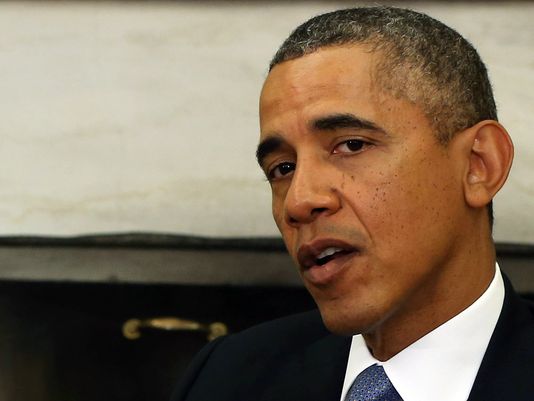As government shutdown nears, no sign of consensus

konknaijaboy | On 30, Sep 2013
Congress is on track for a late-night final clash over the health care law before the government shuts down.
WASHINGTON — Congress shows no sign of heading off the first government shutdown in 17 years as House Republicans were holding firm Monday against a stopgap bill that does not in some way affect President Obama’s health care law.
The House is readying a third attempt to volley back to the Senate, ensuring a late night clash over two additional provisions affecting the health care law that will again meet defeat in the Senate.
As soon as the Senate came in to session on Monday, Majority Leader Harry Reid, D-Nev., tabled without debate two House-passed amendments over the weekend to the spending bill that would delay implementation of the law for one year and repeal a 2.3% tax on medical devices enacted to help pay for the law.
The Senate voted 54-46 along party lines. “We’re at the brink,” said Senate Appropriations Chairwoman Barbara Mikulski, D-Md., “We’re just hours away from a possible government shutdown.”
President Obama and Reid maintain that the only way to avoid a shutdown is to approve the Senate-passed stopgap spending bill through Nov. 15 with no extraneous provisions on Obamacare. “They try to send us something back, they’re spinning their wheels,” Reid said Monday.
In response to the Senate’s action Monday, House Speaker John Boehner said Republicans will offer a third plan that calls for a one-year delay in the requirement that uninsured Americans buy health insurance and the removal of a subsidy to help members of Congress and their staffs pay for health care under the new system. The plan would also remove the employer subsidy for the president, vice president and their staffs.
Asked if he would allow a vote on a stopgap spending bill that doesn’t include provisions affecting that health care law, Boehner said no. “That’s not going to happen,” he said.
STORY: Why Congress is (or isn’t) exempt from Obamacare
The second provision is a reaction to an Office of Personnel Management decision to provide members of Congress and their staffs the same amount of money they get now as part of the federal employees insurance system to pay for policies they will now have to buy on local exchanges, which are state websites where people can shop for and buy insurance.
“There should be no special treatment for the well-connected under ObamaCare. Delaying the individual mandate and withdrawing special exemptions for Congress is the fair thing to do,” said House Majority Leader Eric Cantor, R-Va., in a statement.
Much of the health care law is already in place, including provisions that expand prescription drug discounts and allow children up to age 26 to remain on their parents’ health insurance policies. Tuesday is the first day for uninsured Americans to shop for and buy health insurance policies on the exchanges.
Obama said Monday that he is not resigned to a government shutdown and that he would speak to some members of Congress later in the day. GOP members should “set aside short-term politics and look at the long-term here,” Obama told reporters after a meeting with Israeli Prime Minister Benjamin Netanyahu.
Boehner is unlikely to put the Senate-passed spending resolution to keep the government running through Nov. 15 on the House floor unless it is clear that a critical mass of Republicans will support it. House Minority Leader Nancy Pelosi, D-Calif., said Democrats have made an “explicit offer” to deliver most of their 200 votes if Boehner would agree to put the Senate bill on the floor.
“I think it’s very clear Democrats are making an explicit offer to the speaker to keep government open. Whatever he may bring out of his caucus to bring to the floor, we hope that he will also give a vote to the clean (funding bill),” Pelosi said.
House Republicans could also put forward an even shorter stopgap measure for one week or less to keep the government open and buy leaders more time.
“We’re at an impasse that can only be resolved by Speaker Boehner going to his caucus and saying, ‘Enough is enough,’” said Rep. Chris Van Hollen, D-Md., the top Democrat on the House Budget Committee and a former campaign committee chairman, at a breakfast hosted Monday by The Christian Science Monitor.
If a shutdown does happen–and it looks increasingly likely it will — Van Hollen said he’s not sure when it will end. “I think the scary thing about this period we’re in is that there’s no clear end point to a shutdown,” he said.
The last time the government shut down was in 1995-1996 for a combined period of 28 days during budget standoffs between the Clinton administration and a Republican Congress. Most Americans would not feel the affects of a short-term shutdown because most essential government operations would continue, but a longer-term shutdown could negatively affect the economy and federal workers and inconvenience Americans in need of government services.
Contributing: David Jackson and Gregory Korte
Source: USA TODAY
Related articles
Related Posts
Chris Brown Sentenced To 1,000 Hours Of Community Service... August 17, 2013 | konknaijaboy

Obama talks low as push comes to shove on Surveillance... August 12, 2013 | konknaijaboy
First Lady Obama and Kerry Washington of ABC TV’s Show Scandal drop in at ... May 25, 2013 | konknaijagirl

Kanye West Says President Obama “Used” Him... November 25, 2013 | konknaijaboy
Adele, Beyonce to perform at Michelle Obama’s 50th birthday party... March 11, 2013 | konknaijaboy

Opinion: Wanted – A Martin Luther King moment in Nigeria... September 2, 2013 | konknaijaboy

Boko Haram: 600 Killed In Two Months—-Amnesty International... March 5, 2014 | konknaijaboy















